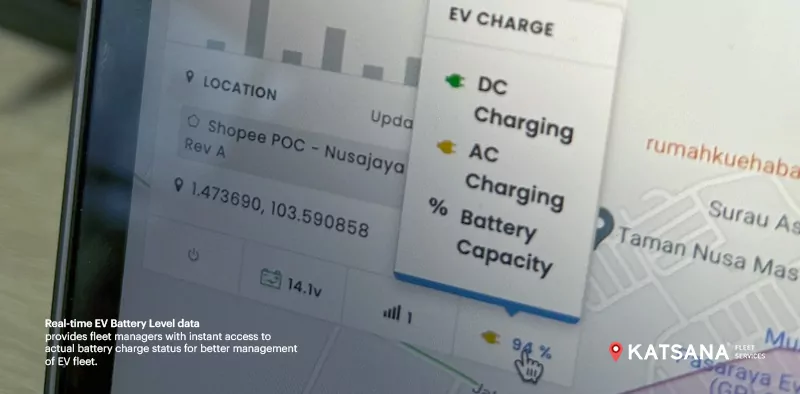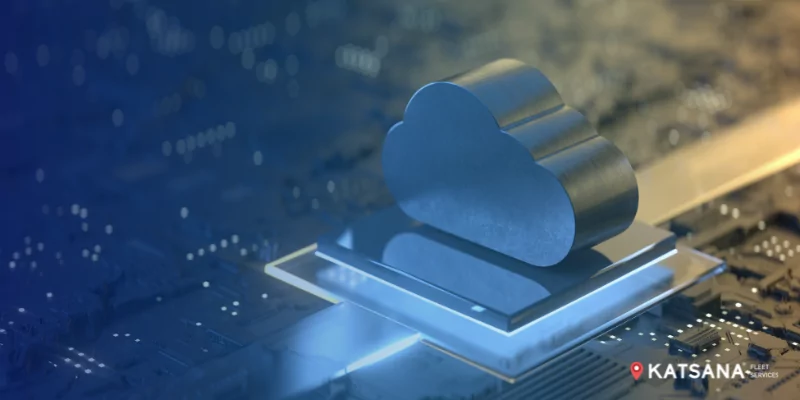As countries globally are battling the impact of global warming – from increased drought to abnormally high temperatures and changes in weather patterns, legislations are being put in place to reduce carbon emissions. Among the areas most impacted by these legislations is the carbon emissions produced in the logistics and transportation industry. Regulatory changes lead to rapid adoption of Electric Vehicles for carrying goods. Consequently, having a well-engineered EV Fleet Management System is of utmost importance in your day-to-day fleet operations.
Note: Refer to KATSANA EV FMS offering here.
New challenges in operating a fleet of Electric Vehicles
Running a fleet of Electric Vehicles brings a new standard and unique challenges never seen in fleet management.
Fleet operators now require new approaches in route planning (making sure that the routes fit the changing demands of the electric vehicle), new service and maintenance schedules, driver training, and proactive ESG (Environmental, Social & Governance) compliance reporting.
Over time, the environmental laws are becoming stricter to meet the Paris Climate Agreements. Consequently, commercial fleet operators are required to adopt pollution control mandates and strict guidelines or face serious penalties.
What is an EV Fleet?
The word ‘EV’ is the acronym for ‘Electric Vehicle’. As such, a group of EVs that a company either buys or lease is known as an EV Fleet. EV fleets may consist of vehicles that utilise electric batteries either wholly or in part. Battery electric vehicles (BEVs) and plug-in hybrid electric vehicles (PHEVs) may be included in EV fleets (PHEVs).
Compared to petrol/diesel vehicles, EVs are a more environmentally friendly choice. Generally, EVs require less maintenance than fuel-powered vehicles, but they aren’t completely maintenance-free.
If you’re on the fence about introducing EVs into your fleet, consider these 10 reasons why EVs are ideal additions to the fleet.
Fleet Management Platform for EV Operators 🚎

EVs by definition no longer employ combustion engines because they rely on electric motors for propulsion.
Trouble is, most fleet management systems and GPS fleet platforms in the market are not equipped to read real-time data from the newer generations of EVs.
Thanks to the continuous advancement of KATSANA Fleet Management Platform, fleet managers are now able to access critical EV data necessary in your transition to clean mobility. Latest advancements allow for real-time access to remote EV data, supporting both fuel-powered and electric vehicles through a unified platform.
Introducing a new telematics dataset for EV Fleet Maintenance ⚡
In internal combustion vehicles, getting real-time data on fuel consumption & fuel level was a critical requirement. Fleet operators need real-time fuel level data to manage fuel spending and understand the operational efficiency of the fleet. This is no longer relevant for EVs.
EV fleet operators consider these as top priorities:
- Real-time EV Battery Level for each vehicle & across the fleet
- Real-time EV charging status (AC/DC High-Performance Chargers)
- Live tracking of all EVs in the fleet
- Battery Health & Degradation over time
- Safety of EV Vehicles and Drivers
In KATSANA, we realised that these important data are not readily available on any fleet management platform. Fleet operators will find the lack of real-time EV data to be a big hurdle in the transition to an all-electric fleet.
Noting the importance of these datasets for EV fleet operators, we have initiated and successfully completed a major engineering program to integrate real-time EV data into the KATSANA Fleet platform.
We are proud to introduce these new EV fleet parameters to address major concerns in EV fleet management:
1. Real-Time EV Battery Level Status

For EV fleet operators, having real-time access to charging status and battery health is necessary to avoid a stranded vehicle. Unlike ICE vehicles that can refuel at any gas station, EV require rather a delicate route planning & management. Fleet operators now have to consider the available battery level on the EV in their route planning considerations.
With KATSANA, the battery status, and the battery history for the entire fleet are logged in real-time and are always available for better planning and management. Not only that, the analytics provided also offer insights that keep track of any errors or misuse that could harm or impair battery health.
2. Real-Time EV Charging status (AC/DC High-Performance Chargers)

Using a Direct Current (DC) / High-Performance Charger (HPC), an EV sedan takes around 2 hours for a complete charge.
Moreover, while a DC charger significantly reduces the time required to charge an EV, it is rather expensive to be installed.
The prohibitive cost of a DC charger may prevent fleet owners from equipping each EV with a dedicated charger. A realistic situation is, that out of the 20 EVs, the operator might only install 3 DC chargers, and another 5 AC (slow) chargers.
EV Fleet operator then has to be diligent in managing charging opportunities. The operator needs access to the real-time battery level of all vehicles in the fleet and plans when to charge them.
Without a proper EV Fleet Management platform, the operator has to constantly communicate with drivers to retrieve the battery level. As you might guess, this is attainable for a small fleet of say 3 EVs. With larger fleets, manually contacting the drivers for EV battery status is no longer workable.
KATSANA EV Fleet platform solves this problem by transmitting EV charging status data in real-time.
- Easily identify which EVs are ready and sufficiently charged at a glance.
- Set up custom notifications when the battery charge is low or completed
- Get real-time, consolidated, and vehicle-specific information on charging progress, speed, and cost.
3. Predicted & Actual Mileage Range

Mileage is not a new parameter, but it is more significant for EVs. EV mileage signifies more than just how much energy is consumed or how well the vehicle is used. Compared to an ICE vehicle, charging an EV is more time-consuming and frequent. In Malaysia, there is still a lack of EV charging infrastructures nationwide. Hence EV fleet managers will need to be able to schedule long-distance logistics around the available options by analysing how far each EV can travel.
The system developed by KATSANA is capable to analyse the predicted and actual mileage range of EVs. With fleet management and future asset purchase decisions in mind, data on model-specific EVs for capabilities such as fast charging, average charge trip range, and battery depreciation can be useful.
4. Hassle-free Installation & Integration with In-Built Cloud System

The current technology system developed by KATSANA makes it easy to scale. The latest system features a hassle-free installation and integration process. As a result, businesses can now easily link their EVs to the current KATSANA platform without voiding warranties and retrieve the data remotely thanks to the main benefit of cloud-based software and wireless hardware.
The latest technology makes it possible to wirelessly access the system and collect data directly from the vehicle ECU (Electronic Control Unit). As a result, this increases the accuracy of the basic data collected, such as the battery level and odometer.
5. Live Vehicle & Asset Tracking

Greater connectivity offered by EVs enables KATSANA to build more innovative EV tracking technologies. With this data at their disposal, fleet operators may be able to create better-planned dispatch schedules based on real-time connections.
With KATSANA, fleet managers may now track all vehicles in real-time and monitor their large fleets in cluster views on the map. Additionally, the system will also flag vehicles leaving authorised geofences, and provide customers a more precise ETA data.
6. Driver Behavior Monitoring System

The way drivers operate their vehicles affects the condition and lifespan in a significant way.
For example in ICE vehicles, drivers tend to over-speed and use high-gearing & high RPM. This will likely damage the engine faster than safer drivers that follow the speed limit and use low RPM to cruise.
Correspondingly, for EVs constantly driving at high speed will strain the battery more, and may introduce a higher risk to the vehicle and the driver.
As such, it is important for EV fleet operators to be able to control the use of the vehicles and identify drivers that are riskier than others. This ability provides numerous benefits, for example:
- Prolonging the lifespan of the EV battery
- Reducing the wear & tear of components (tyres, brakes, suspensions, etc)
- Mitigate risky driving behaviors & costly incidents
- Low-speed accidents are cheaper to fix than high-speed accidents
- Helps lower insurance cost for the fleet
The KATSANA platform makes it simple for fleet managers to keep an eye on the behaviour and activities of EV drivers. RFID tags, Staff Cards and Malaysian NRIC tags are examples of add-ons available in KATSANA Platform to authenticate and profile drivers. Moreover, having a driver identification system in an EV fleet ensures that only authorised drivers are allowed to use the vehicles.
Summary
In summary, the introduction of EVs requires new ways of managing fleets. Collecting and analysing the data generated by EVs and related infrastructure will be crucial for business. While it is no simple task, businesses with EVs in their fleet need a comprehensive EV Fleet Management System, like KATSANA FMS that has an uptime above 99.5%, to perform at their best.
Focus on your core business and let KATSANA handle the headache of EV data collection and analysis!
KATSANA latest tech provides all the important information needed to monitor and analyse EVs in one single platform. Each EV’s performance and health data are wirelessly and instantaneously collected to achieve this. This enables all fleet managers to efficiently streamline the management and data collection activities of their fleet.
Customers of KATSANA may now confidently manage their EV fleets as there won’t be any data gaps in the reports.
Connect with us to find out which EV fleet plan is most suitable for your fleet and business.

